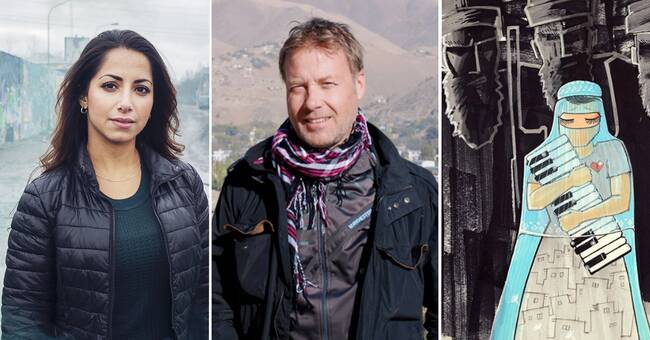Shamsia Hassani is Afghanistan's first female graffiti artist, and in recent days she has posted illustrations on Instagram that capture the concerns of many, especially female, cultural figures: one of the photos depicts a girl holding her keyboard tightly, surrounded by armed Taliban.
The last time the Taliban ruled (1994-2001), many cultural expressions were banned, cultural practitioners were murdered, and women were not allowed to work or train.
One who fled Afghanistan is Khazar Fatemi, who came to Sweden as a 7-year-old.
Today, she is an award-winning cultural journalist and has, among other things, done reports and programs about the war-torn country's cultural heritage and the cultural workers who defy the threat from the Taliban.
"You can sing Koranic verses"
Khazar Fatemi describes the Taliban's view of culture as instrumental: art, music and the media are seen as means of influence.
Therefore, they are against culture that does not affect the population in the direction the Taliban want.
- Only religious culture is accepted, you can sing Koranic verses, she says.
Khazar Fatemi does not give much for the Taliban's new "softer" rhetoric.
And the statements that girls should be allowed to get an education do not mean that they can study freely, she says.
- When they say that girls and women should be allowed to educate themselves "in accordance with sharia", it means that they can go to Koran school.
They are not allowed to study philosophy, geography, art or whatever they want, but it is about religious education, she says.
Modernization is minimal
When the Taliban left Kabul in 2001, people celebrated in the streets by playing music and singing.
Until then, they had been allowed to smuggle in culture, hiding cassette tapes was almost a sport.
Now many are wondering if the strict ban of the 90s will come again - among other things, the Academy of Music in Sweden writes in a statement that they "fear a repeat of similar crimes".
Anders Rosén at the Swedish Afghanistan Committee believes that the media society and the development that has taken place in Afghanistan over the past 20 years makes it more difficult for the Taliban today, for example, to ban music.
- We have a different Afghanistan today than in the 90s, he says.
The Taliban have long continued to control parts of Afghanistan, and there they have not imposed cultural bans like those introduced in the 1990s, according to him.
Khazar Fatemi believes that the Taliban have adapted to some extent, but the modernization is minimal, she says.
- The last time the Taliban ruled, they were not allowed to have televisions or radios.
Now the Taliban instead control the media from within, says Khazar Fatemi.
In the video, you can hear Anders Rosén at the Swedish Afghanistan Committee.

